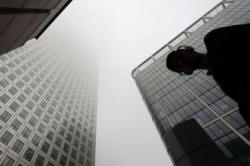|
 UK
economy picks up in second quarter, recovery pace revised higher UK
economy picks up in second quarter, recovery pace revised higher
 Send a link to a friend
Send a link to a friend
[September 30, 2014] By
Andy Bruce and William Schomberg
LONDON (Reuters) - Britain's economy grew
more quickly than previously thought in the second quarter and its
recovery from the financial crisis has been less sluggish than first
estimated, according to official figures that use a new way of
calculating data.
|
|
 Britain's gross domestic product (GDP) rose 0.9 percent in the
three months from April to June this year, the fastest increase
since the third quarter of 2013. Britain's gross domestic product (GDP) rose 0.9 percent in the
three months from April to June this year, the fastest increase
since the third quarter of 2013.
Growth was fueled by the strongest expansion in Britain's vast
services industry in almost three years, while levels of business
investment also rose strongly, the Office for National Statistics
said on Tuesday. However, exports were again weak.
The data showed Britain rebounded from the deep 2008-09 recession
earlier than thought, at least in terms of growth.
The economy passed its previous 2008 peak in the third quarter of
2013, nine months earlier than previously thought, and stood 2.7
percent above its pre-crisis size by June.
"Today's significant revisions to the UK's national accounts do not
change the fundamental picture that the economy's performance since
the recession began in 2008 has been very weak by historical and
international standards," consultancy Capital Economics' economist,
Samuel Tombs, said. He said the data was unlikely to change the
debate within the Bank of England about when to start raising
interest rates.

The 0.9 percent growth in the second quarter growth was a slight
increase from an earlier reading of 0.8 percent, which economists
had expected would be left unchanged.
The figures also showed the economy grew 0.7 percent in the first
three months of the year, down slightly from 0.8 percent previously
reported. On an annual basis, the economy was 3.2 percent bigger
than the second quarter of 2013.
The new measures of growth follow European Union-wide changes to
national accounts designed to better measure the size and scope of
its economies, including -- for the first time -- treating research
and development spending as a contributor to growth and estimates of
illicit or black economy activity.
The ONS released current account data, which showed that Britain's
deficit with the rest of the world widened to 23.1 billion pounds
from 20.5 billion in first three months of 2014.
That was equivalent to 5.2 percent of GDP, up from 4.7 percent in
the first quarter.
Economists had expected the current account gap to narrow to 17
billion pounds. Much of the deterioration was due to lower income
from foreign investments held by British companies.

[to top of second column] |

2015 ELECTION
Tuesday's figures were welcomed by Conservative Party finance
minister George Osborne, who said they were further evidence that
his economic plan is working. The economy is the major policy area
in the run up to May's general election.
The opposition Labour party says most Brions are not feeling the
benefit of the recovery, with wage growth still very weak.
The Bank of England forecasts that Britain's economy will grow by
3.5 percent this year, which would be its best rate of growth in
about a decade. BoE policymakers are keen to see the recovery
broaden from consumption and into investment which would sustain the
upturn.
Business investment rose 11.0 percent on the year during the second
quarter, and 3.3 percent from April to June alone.
Recent business surveys suggest the momentum behind Britain's swift
economic recovery will carry through to the final months of this
year. A separate survey published on Tuesday showed British consumer
morale remained close to a recent nine-year high despite falling a
touch in September.
And a measure of house prices showed growth in property prices fell
back this month, easing some concerns about a housing market boom.
The new methods of calculating GDP have also led to revisions of
British government debt measures.

The ONS revised Britain's budget deficit excluding banks for the
2013/14 fiscal year to 5.7 percent of GDP, compared with 7.2 in the
previous year. The earlier measure had shown a 6.5 percent deficit
for 2013/14.
(Editing by Louise Ireland)
[© 2014 Thomson Reuters. All rights
reserved.] Copyright 2014 Reuters. All rights reserved. This material may not be published,
broadcast, rewritten or redistributed. |